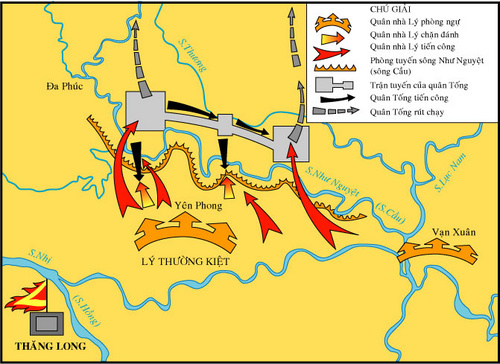In the war against Song aggressors (1075 – 1077), applying the military thought “strike first”, the military and the people of Dai Viet proactively launched attacks in advance to destroy the enemy’s preparation and minimize their strength and will, laying a foundation for victories in the war. That typical art of war is our peoples’ excellent creativity, which needs studying and promoting in the new condition.
 |
|
Sketch map of the battle in Nhu Nguyet river (file photo) |
1. Grasping and correctly assessing the situation and balance of power to plan daring attacks. To get strategic proactiveness, Ly Thuong Kiet advocated “striking first”. This is a very daring but sound thought, likely causing surprise, being appropriate for our country’s condition at that time. If we had only secretly prepared for a fight while we had already known the Song dynasty’s plot, we would have been hardly proactive and possibly suffered from severe losses. It can be said that proactively attacking to break the enemy’s will to cause surprise and chaos in their own land is a feature in the national history. It is worth noting that the thought was realized in the very right time by the Ly dynasty, thus creating synergy to annihilate the enemy. Ly Thuong Kiet launched attacks when our forces were rather strong at that time; meanwhile, about 100,000 enemy troops were garrisoned in Yongzhou, Qinzhou, Lianzhou, but newly recruited. In addition, that withdrawal of the enemy seasoned troops from the North had not yet finished helped us gain victory quickly and strongly wear down the enemy’s invasion will.
2. Building firm stance and determination within our troops, winning support from the people of the enemy for the strategic attack. Having moved to attack target from afar in Song dangerous and strange terrain, being difficult in ensuring food for troops and horses, Ly Thuong Kiet opportunely issued a proclamation which pointed out justice of the attack. It could be understood that killing Song troops was protecting Dai Viet’s homeland. Accordingly, Ly dynasty built firm stance and strengthened determination for its troops to overcome all hardships and challenges to defeat the enemy. Also, taking advantage of and gaining support from the Song people is a feature in Dai Viet’s military thought “strike first”. On the march, thoroughly grasping the situation and realizing the Song people’s discontent with continuous wars between Song dynasty and Liao and Xia, and with its ruthless suppression and exploitation, Ly Thuong Kiet released a Proclamation on fighting Song troops, accusing Song dynasty’s crime and its plots for an invasion of Dai Viet, clarifying our march’s target in Song land, which could be regarded as a legitimate act of self-defence. That was really a sound and creative action and sharpness of High Command of Ly dynasty, effectively and directly affecting the Song people’s thought and morale. Thus, wherever the Ly troops marched over, they received welcome and support from the Song locals.
3. Flexibly applying forms of operations to gain victory. Ly Thuong Kiet divided his troops into two armies, namely naval army and ground army, to move to the enemy’s country. One of the two armies consisted of soldiers in the North’s border localities, led by ethnic generals, namely Ton Dan, Luu Ky, Hoang Kim Man, Than Canh Phuc, Vi Thu An, suddenly attacking and destroying Song border camps and posts, such as Guwan, Yongping, Taiping, and Hengshan, drawing the enemy to the Southwest, thus making Qinzhou and Lianzhou’s defence in seaport direction exposed. Seizing this opportunity, the main army led by Ly Thuong Kiet in Vinh An (Mong Cai, Quang Ninh), traveled by ships, raided the enemy’s camps along seashore, occupied Qinzhou citadel (December 31st 1075) and Lianzhou citadel (January 2nd 1076), then moved to join the ground army led by Ton Dan to attack and besiege Yongzhou citadel. The raid on outer targets was victorious, rocking the Song dynasty. They hurriedly deployed 10,000 troops to rescue Lianzhou. However, by “besieging the citadel, annihilating reinforcements”, Dai Viet troops ambushed and defeated the reinforcements at Kunlun border pass; at the same time, continued besieging and adopted various methods to attack Lianzhou citadel. Without reinforcements, being intensely attacked by our troops, Lianzhou citadel finally fell. At that time, the attack’s aims were achieved (April 1076), our troops were proactively repatriated.
Colonel, Doctor Nguyen Thanh Huu